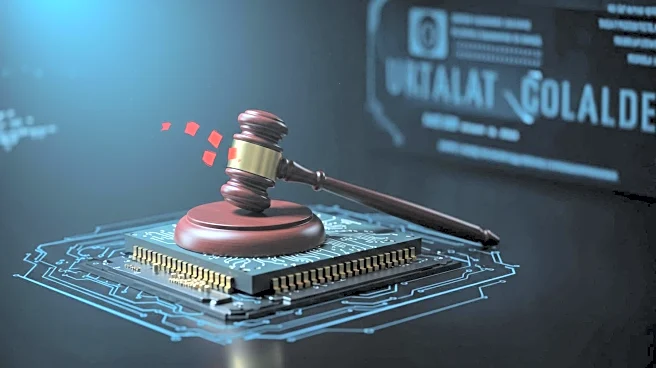What's Happening?
Belgian publishers and authors have successfully obtained a court order from the Brussels Business Court to block access to five major piracy sites, including Anna's Archive and Z-Library. This legal action, initiated by organizations such as the Flemish Publishers Association and the Association of Belgian Publishers, aims to curb the unauthorized use of copyrighted content by these sites. The court's decision mandates Internet service providers, search engines, and other digital platforms to restrict access to these sites, which have been identified as sources for training generative AI models without permission from rights holders. Niels Famaey, director of the Flemish Publishers Association, highlights the challenge posed by Big Tech companies using pirated content for AI training, describing it as deliberate theft and copyright infringement.
Why It's Important?
The court order represents a significant step in the fight against digital piracy, particularly in the context of AI development. By blocking access to piracy sites, Belgian publishers aim to protect their intellectual property and ensure fair compensation for the use of their works. This move sends a strong message to technology companies that have been using pirated content to train AI models, potentially impacting the way AI systems are developed and trained. The decision underscores the importance of respecting copyright laws and the need for transparency and equitable remuneration in the use of literary works. It also highlights the ongoing struggle between content creators and technology companies over the use of copyrighted material.
What's Next?
The court order is expected to have a symbolic impact, signaling to Big Tech companies the seriousness of copyright infringement issues. Belgian publishers are likely to continue advocating for stricter enforcement of copyright laws and may push for further legal actions against piracy sites. The decision may also influence discussions within the European Union regarding the European AI Act and the responsibilities of tech companies in using copyrighted content. As piracy sites are known to be elusive, publishers may focus on collaborating with digital platforms to enhance the effectiveness of site-blocking measures and explore additional legal avenues to protect their intellectual property.
Beyond the Headlines
The court's decision raises broader ethical and legal questions about the use of copyrighted content in AI training. It challenges the notion of free access to information on the internet and the balance between innovation and intellectual property rights. The case may prompt a reevaluation of the role of technology companies in safeguarding copyrighted material and the ethical implications of using pirated content for commercial gain. Additionally, it highlights the need for international cooperation in addressing digital piracy and the importance of developing robust legal frameworks to protect creators' rights in the digital age.









